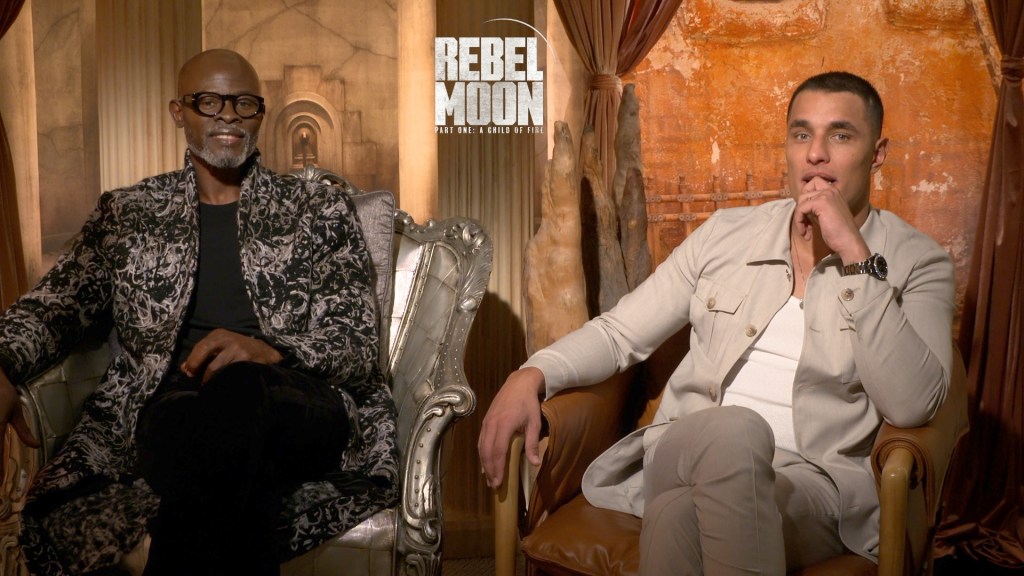ComingSoon Senior Editor Spencer Legacy spoke with Rebel Moon stars Djimon Hounsou and Staz Nair about the latest Zack Snyder movie. The duo delved into about the different cultures showcased in the film and their respective characters. Rebel Moon – Part One is now playing in limited theaters and will be released on Netflix on Thursday, December 21.
“A peaceful colony on the edge of the galaxy is threatened by the armies of a tyrannical regent named Balisarius,” reads the film’s synopsis. “The desperate civilians dispatch Kora, a young woman who has a mysterious past, to seek out warriors from nearby planets to help them challenge the regent.”
Spencer Legacy: Djimon, General Titus is a character that’s carrying a lot of grief. He winds up being motivated not by a chance of redemption but by revenge. Can you speak to carrying these heavy themes in your performance?
Djimon Hounsou: These themes resonate very organically for me. These themes are themes that I feel in — terms of story for that matter — speak volumes of the indoctrination of my continent, Africa. For example, the geopolitical tentacles that have been holding that continent back, being the richest continent in the world, and yet cannot have anything to show for it. So that, in terms of story, was quite powerful and I felt very organically connected immediately with the story.
Staz, the taming the griffin scene is a really great introduction. Your character has this connection with animals and nature. What did you like most about how your character was introduced?
Staz Nair: That’s a good question. What did I like the most about him? I think his sensitivity. I think it would’ve been easy for Zack to have imagined him and myself to have performed him in such a way where he was a bit more brash, a bit more boisterous, a bit more externally masculine, for lack of a better term.
But what I loved about him and this relationship with the bird instantly gave me this room to create a far more calm, intuitive, kind of introspective and insular character, which goes against his physicality, you know? It also gives him a nice place to rise when you see him in battle because he’s fierce and very visceral, and it’s a wonderful journey for the spectators to see that this quiet man has a lot burning on the inside.
Djimon, you’ve been a part of some massive franchises in the past, and Rebel Moon has aspirations of launching a new one. What about this world really grabbed you and made you want to be a part of that on the ground floor?
Djimon Hounsou: Well, I think it’s the underlying messages. The carelessness of the treatment of our planet is one, the geopolitical interaction between various countries, but more importantly, one that keeps the continent of Africa always in check. Those two elements are quite relevant to our day-to-day living.
Staz Nair: And why we’re lucky enough to have him spearhead this together.
Djimon Hounsou: Yeah.
Staz, you speak a new language in the movie that blends Russian and Portuguese. Can you speak to blending your own culture with this new fictitious one?
Staz Nair: This is the wonderful thing about Zack, right? He gives us opportunities to personalize this. And my wife is Portuguese — well, she’s Portuguese-Angolan, actually, so we got to incorporate my love for life, which is my wife, with my love for art, which is just such a beautiful thing to be able to do, and such a thoughtful thing to be able to do…
We talk about how much he honors culture in this movie, you know? That instantly makes you, as a second generation Indian in the UK [and] as someone who’s always worked neither here nor there, getting someone who’s willing and open and wanting to represent you in a way and giving you freedom to represent in your own way is super cool, man.
Djimon Hounsou: The diverse world that he was able to create in bringing a cast from various parts of the globe were just a very powerful statement. A huge statement along with the story itself was very grounding. It didn’t seem foreign given the fact that we’re in space. But of course, space is a character that most of us were not familiar with in this story.
Staz Nair: I haven’t been there. [Laughs].
Djimon Hounsou: [Laughs]. But to add to something that Staz spoke about, the culture here also and the way that he embraced it allowed me to bring my culture to life in the story was also very poignant, you know? You would see that in Part Two. More in Part Two than you get on the first part.










